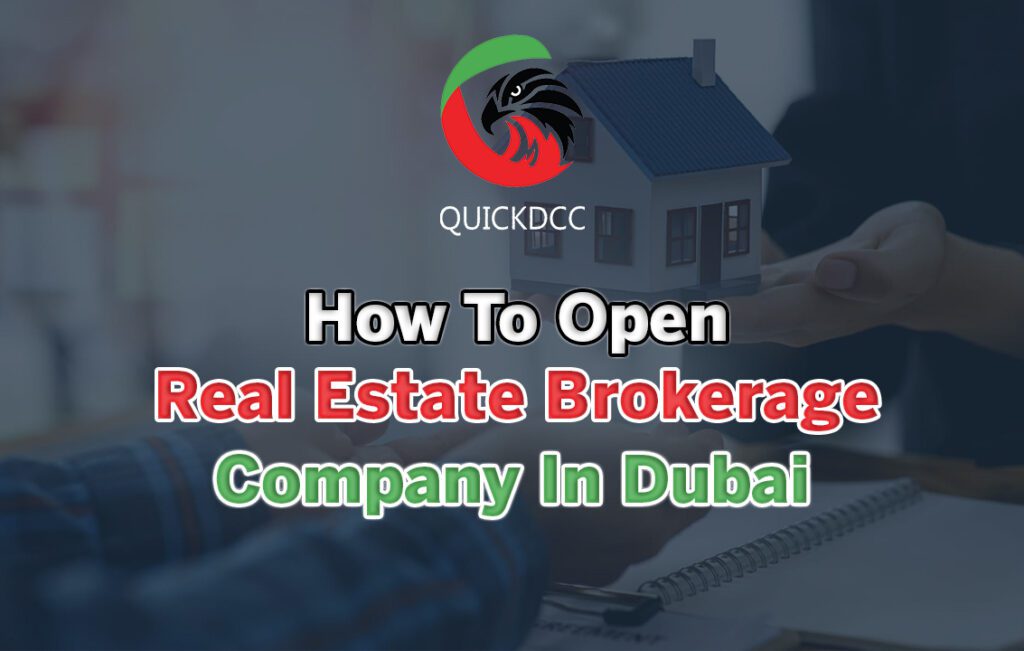Dubai, a dazzling gem in the heart of the UAE, is known for its iconic skyline and luxury shopping and is a thriving hub for real estate investment. With an ever-growing demand for prime properties and a diverse expatriate community seeking homes amidst its vibrant culture, the city presents unparalleled opportunities for entrepreneurs looking into the real estate sector. If you’ve ever dreamed of launching your own real estate brokerage company in Dubai, now is the perfect time to turn that vision into reality.
However, navigating the intricate regulations and market dynamics landscape can be daunting. Whether you’re a seasoned professional or new to the industry, understanding how to establish your brokerage effectively is crucial for success. In this article, we will guide you through every essential step to open your real estate brokerage company in Dubai—from obtaining necessary licenses to leveraging marketing strategies that attract clients. Join us as we unravel the secrets to making your mark in one of the world’s most lucrative property markets!
Advantages of Starting a Real Estate Company in Dubai
Effortless Business Setup
One of the most attractive aspects of starting a real estate brokerage in Dubai is the ease of business. The government offers a streamlined registration process, and agencies like QUICKDCC Documents Clearing Services can assist with paperwork, making the setup process smooth and efficient.
No Property Tax
In Dubai, property owners enjoy the significant advantage of not having to pay property taxes. This tax-free environment is a major draw for investors, allowing brokers to offer more competitive pricing and higher profit margins.
High Rental Returns
Dubai is renowned for its high rental yields, which average at least 5.82% annually. This makes the city one of the most profitable places globally for property investors, creating ample opportunities for real estate brokers to earn substantial commissions.
Choosing Your Legal Structure
When starting a real estate brokerage in Dubai, the first critical decision is choosing your legal structure. The two most common options are a Limited Liability Company (LLC) and Sole Proprietorship.
LLC vs. Sole Proprietorship
An LLC provides limited liability, protecting your assets in case of business debts. It also allows for a more flexible ownership structure, which can be beneficial if you plan to have partners. On the other hand, a Sole Proprietorship is more straightforward and less expensive to establish, but it offers no protection for your assets.
Selecting a Company Name
Your company name is more than just a label; it’s your brand’s identity. In Dubai, choosing a unique trade name that reflects your business ethos and stands out in the competitive market is essential.


Steps to Register Your Trade Name
- Research: Ensure the name isn’t already in use or trademarked.
- Application: Submit the chosen name for approval through the Department of Economic Development (DED).
- Approval: Once approved, you can proceed with the rest of your business setup.
Obtaining RERA Certification
To operate legally as a real estate broker in Dubai, you must obtain certification from the Real Estate Regulatory Agency (RERA). This certification is crucial as it establishes your credibility and compliance with local regulations.
Overview of Dubai Real Estate Institute (DREI)
RERA certification requires completing a course at the Dubai Real Estate Institute (DREI), which covers the fundamentals of Dubai’s real estate laws, ethics, and practices.
Steps to Get Certified by RERA
- Enroll: Sign up for the required training course at DREI.
- Pass the Exam: Complete the course and pass the final exam.
- Obtain Your Broker ID: After passing the exam, you’ll receive your Broker ID, allowing you to operate legally.
Preparing the Memorandum of Association (MoA)
The Memorandum of Association (MoA) is a vital legal document that outlines your company’s structure, purpose, and operating procedures. It must be drafted carefully and notarized to ensure legal compliance.
How to Draft and Notarize Your MoA
- Consult with a Legal Expert: Work with a lawyer to draft the MoA, ensuring it covers all necessary aspects of your business structure.
- Notarization: Once drafted, the MoA must be notarized by a public notary in Dubai.
Applying for a Trade License
A trade license is mandatory for any business operating in Dubai. This license allows you to conduct your real estate brokerage activities legally.
Step-by-Step Process for Trade License Application
- Submit Your Application: Apply for your trade license through the Department of Economic Development (DED).
- Pay the Fees: The fees vary depending on your business structure and activities.
- Receive Your License: Once approved, you’ll receive your trade license, which will allow you to start your operations.
Getting Dubai Land Department (DLD) Approval
The Dubai Land Department (DLD) is crucial in regulating the real estate market. Securing approval from the DLD is necessary to operate legally and gain credibility in the market.
How to Secure DLD Approval
- Submit Your Documents: Provide all necessary documents, including your trade license, MoA, and RERA certification.
- Approval Process: The DLD will review your submission and, once satisfied, grant you approval to operate.
Setting Up Your Office
Dubai law requires all businesses to have physical office space. Securing an appropriate location is critical to your company’s image and operations.
Requirements for Office Space
- Commercial Lease Agreement: Secure a lease for a commercial space that meets the legal requirements.
- Location: Choose an area that is accessible to clients and reputable.
Hiring Qualified Staff
A successful brokerage relies on experienced and qualified staff. Hiring the right people will enhance your company’s reputation and performance.
Process of Sponsoring Work Visas
- Recruitment: Identify and hire experienced professionals.
- Visa Sponsorship: Sponsor work visas for any foreign nationals you employ, ensuring they are legally authorized to work in Dubai.
Developing a Marketing Strategy
A strong marketing strategy is essential in a competitive market like Dubai. Building a robust online presence and a distinctive brand identity will help you attract clients and stand out.
Building an Online Presence
- Website: Create a professional, user-friendly website.
- Social Media: Engage with potential clients through platforms like Instagram, LinkedIn, and Facebook.
Staying Compliant
Compliance is crucial to avoid legal issues and penalties. Regular audits and timely license and certification renewals will keep your business running smoothly.
Regular Audits and License Renewals
- Schedule Audits: Conduct regular financial and operational audits.
- Renewal Deadlines: Keep track of renewal dates for all licenses and certifications.
Building Industry Connections
Networking is a critical component of success in the real estate industry. Building relationships with developers, investors, and brokers will provide valuable opportunities and insights.
Importance of Industry Events
- Attend Conferences: Participate in real estate conferences and seminars.
- Join Associations: Become a member of industry associations for networking opportunities.
Staying Updated
The real estate market in Dubai is dynamic and constantly evolving. Staying informed about market trends will help you adapt your strategies and remain competitive.
Keeping Up with Market Trends
- Research: Regularly research market trends and forecasts.
- Adjust Strategies: Modify your business strategies based on the latest market data.
Implementing CRM
Customer Relationship Management (CRM) software is invaluable for managing client relationships, tracking leads, and improving customer service.
How CRM Improves Customer Service
- Client Management: CRM is used to keep detailed records of client interactions.
- Lead Tracking: Monitor and follow up on leads to maximize conversion rates.
Expanding Services
Diversifying your services can increase revenue streams and appeal to a broader client base. Consider offering property management or investment advisory services.
Offering Additional Services
- Property Management: Provide services to manage rental properties on behalf of clients.
- Investment Advisory: Offer advice on property investments to attract high-net-worth clients.
Why QUICKDCC Is Your Best Partner for Launching a Real Estate Brokerage in Dubai
Starting a real estate brokerage in Dubai is an exciting opportunity, but it can be a bit overwhelming, especially if you’re unfamiliar with the local requirements. From understanding legal rules to getting the right approvals, the process can feel like a maze. That’s where QUICKDCC Documents Clearing Services comes in. We’re here to guide you every step of the way, ensuring your business gets up and running smoothly.
Our team knows the ins and outs of Dubai’s real estate market and the rules you must follow. We take care of everything, from helping you get your RERA certification to securing your trade license and getting approval from the Dubai Land Department. With QUICKDCC, you’re not just hiring a service; you’re gaining a partner dedicated to helping you achieve your real estate goals.
Don’t let the complexity of starting a business in Dubai hold you back. With QUICKDCC, you can focus on growing your business while we handle the paperwork and legal stuff. Ready to get started? Book your free consultation today by calling +971561541675 or sending a WhatsApp message to the same number. Let us help you succeed in Dubai’s booming real estate market.
Frequently Asked Questions
The cost can vary widely depending on office location, staffing, and legal fees, but you should budget for at least AED 50,000 to AED 100,000 to cover initial expenses.
While it’s not mandatory for certain free zone businesses, having a local partner can be beneficial, especially for LLCs, as they can assist with local market insights and connections.
The process usually takes a few weeks, depending on the availability of courses and the time taken to pass the exam.
Yes, you can operate from a free zone, but it’s essential to understand the specific regulations and limitations that apply to free zone businesses.
Ongoing requirements include renewing your trade license annually, obtaining RERA certification, and ensuring all financial audits and government filings are current.
Related Articles:
- How To Cancel Maid Visa In Dubai
- Comprehensive Guide To Dubai Partner And Investor Visas
- Company Trade License Renewal Services in Dubai, UAE
- How To Open Offshore Company In Dubai
- How much is an E-Commerce License in Dubai?
- How to Register a Company in the DMCC Free Zone
- E-Trader VS E-Commerce License in Dubai
- Dubai Visa: Apply Tourist & Visit Visa Online
- DHA & MOH Medical Typing Services for UAE
- How To Check And Pay RTA Traffic Fines In Dubai, UAE
- How To Renew a Maid Visa In Dubai
- What Is The Best Business To Start In Dubai 2025?
- Complete Guide to UAE Amnesty 2024
- How to Get a Teaching License in Dubai, UAE

